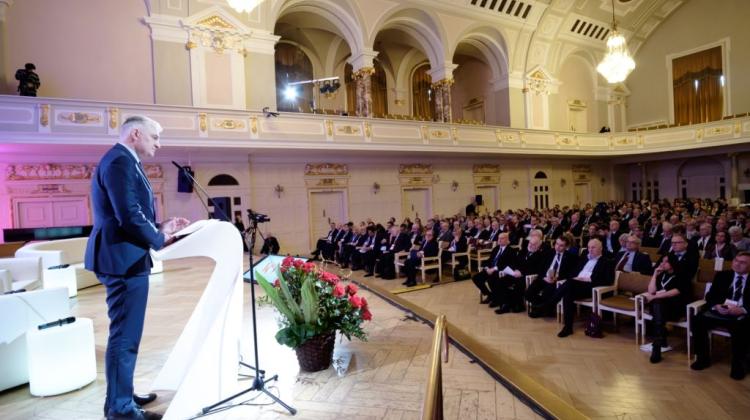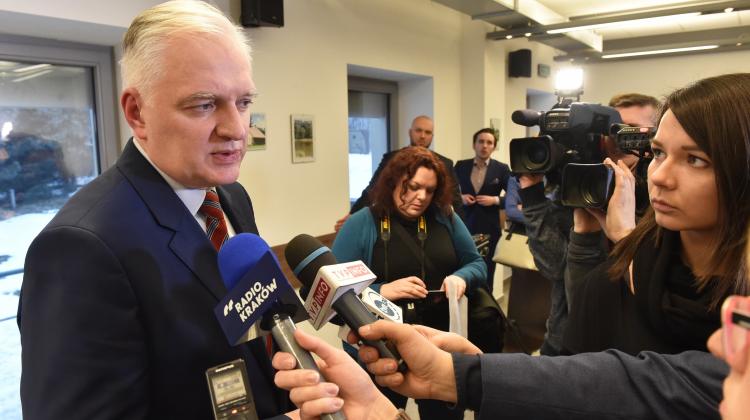Ministry of Science does not preclude activities to maintain new infrastructure

Ministry of Science does not preclude activities related to the maintenance of research infrastructure funded by the EU; the ministry can not agree to objects crucial for Polish science not being used - said Deputy Minister of Science Marek Ratajczak in the Sejm.
Deputy Jan Lopata (PSL) inquired in the Sejm about the maintenance of research infrastructure (e.g. buildings and laboratories) built at universities with EU funds in 2007-2013 (in the first financial perspective). He wanted to know whether the Ministry of Science had conducted a thorough analysis of the needs arising from the cost of maintaining the infrastructure - and whether the fact had been taken into account that for five years the majority of new facilities and equipment can be used only to conduct statutory activity and research projects (and not for commercial purposes).
When research centres applied for money for new investments in the first financial perspective of the EU, they were asked for an in-depth analysis of future possibilities of maintaining the new infrastructure. Every beneficiary had to declare that they would bear the cost of maintenance - reminded the deputy minister.
He assured, however, that the authorities of the Ministry of Science are aware that in some cases the ability to maintain these facilities could be estimated too optimistically. "Some of the objects were built based on the assumption that the number of students in the given college not only would not drop, but may even increase, including students paying for the education. We are aware of this, we analyse the situation on an ongoing basis" - said the deputy minister.
In his opinion, "we can not ignore the fact that certain objects, crucial for Polish science, could be unused". Ratajczak also announced that the Ministry of Science "anticipates certain activities for entities that report such problems".
He suggested that the needs associated with the maintenance of the new infrastructure could be included as part of the broadly understood subsidy for statutory activity. "This is why we sought an increase in spending on education in 2015" - he explained.
Ratajczak reminded that in 2015 the increase in budgetary spending on science is expected to reach more than 10 percent compared to the current year. He estimated that between 2015 and 2020 there would be a constant, dynamic growth of these expenditures. "But please do not expect me to declare specific amounts or growth rate in specific years" - reserved minister, responding to the question posed by Włodzimierz Bernacki (PiS) regarding our commitments under the Lisbon Strategy.
According to this strategy, by 2020 the expenditures on education in EU countries should reach the level of 3 percent GDP. "This requires us to increase spending on science each year by at least 20 percent" - said the deputy, asking the minister to present a strategy for growth.
Prime Minister Ewa Kopacz in his expose pledged to increase spending on science to the level of 2 percent by 2020. According to Deputy Minister, "this is the certainly realistic, assuming the macroeconomic forecasts that can be made today".
Józefa Hrynkiewicz (PiS) asked about the future of research institutes. "What are the government’s goals in eliminating scientific institutions, including those that conduct applied research, often in unique specialisations?" - she inquired. According to her, 40 institutions are at risk, for example the Institute of Horticulture in Skierniewice and offices in the capital: the Institute of Labour and Social Affairs, the Institute of Neurology and Psychiatry, National Institute of Public Health, Institute of Rheumatology.
"None of these units is in liquidation, nor do I believe that it would be in liquidation in the future" - assured the representative of the government. He admitted, however, that the last two years had been difficult for research institutes.
Ratajczak reminded that if the Minister of Science receives specific demands or requests related to the functioning of research institutes, the Ministry of Science - in consultation with the institute leadership - seeks to solve the problem, for example by restructuring. He added that part of the activities of national research institutions is financed from the budgets of ministers (for example of agriculture, labour and health - PAP), which directly supervise these institutes and set their tasks.
PAP - Science and Scholarship in Poland
zan/ mki/ abr/
tr. RL
Przed dodaniem komentarza prosimy o zapoznanie z Regulaminem forum serwisu Nauka w Polsce.


















